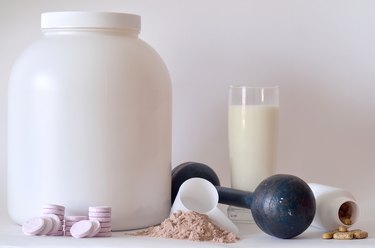
Gout patients must avoid foods high in the organic chemical purine to prevent outbreaks. Purine increases uric acid in the body, which can crystallize in the joints and cause gout attacks. Some high-protein foods, such as meats, seafood and poultry, are purine rich, but most protein-shake ingredients are not. To minimize gout flare-ups while maximizing protein intake, rely on dairy products to fuel your workout and recovery. Check with your doctor before making significant dietary changes.
Ingredients to Use
Video of the Day
Skim milk and plain, fat-free yogurt are the ultimate antigout shake ingredients. Low-fat dairy products actually reduce the risk of gout attacks, so these high-protein foods should be part of your daily diet. Skim milk has 8 grams of protein and only 83 calories per cup. Nonfat yogurt has anywhere from 13 to 23 grams of protein per cup. One cup of Greek yogurt and a cup of skim milk in a shake or smoothie will contribute 31 grams of protein and only 213 calories.
Video of the Day
Protein Powders
If you like to add protein powder to your workout shakes, whey protein isolate -- derived from milk -- is a good choice. It contains gycomacropeptide, which is a component of milk that appears to reduce the risk of gout. Plant-based protein powders, such as soy, pea, hemp and rice, won't make gout worse, but they don't have the protective effect that dairy products do.
Ingredients to Avoid
You won't be tempted to add the worst gout-causing foods -- red meat, organ meat and seafood -- to your protein shake. But other common shake ingredients are also worth avoiding. Fructose consumption is associated with increased risk of gout, so avoid prepackaged shakes that contain high-fructose corn syrup. Minimize other high-fructose sweeteners, such as agave syrup and honey, and white sugar -- sucrose -- which is 50 percent fructose. Don't add alcohol to shakes or make a habit of postworkout beers. Alcohol and spirits are both high in purine and gout sufferers should avoid them.
Protein Requirements
Human protein requirements vary from 0.4 to 0.8 grams per pound of body weight. For example, a 150-pound adult needs 60 to 120 grams of protein per day depending on activity level and caloric intake. Sixty to 75 grams per day is plenty for most, but competitive athletes and serious weight lifters have protein needs towards the high end of the range. Don't consume excess protein -- getting more won't help you build muscle. Aim to get approximately 15 percent of your calories from protein for optimal fitness and health.
The Perfect Shake
To maximize a protein shake's benefits, include additional gout-fighting ingredients that taste great. Cherries help lower uric acid levels, so add frozen cherries and vanilla extract to a basic milk-and-yogurt base. Coffee also seems to reduce gout outbreaks. Coffee ice cubes blended with milk and a small amount of chocolate syrup will make a frozen mocha treat. Daily moderate vitamin C intake decreases uric acid in the body, so add some vitamin-C-rich fruit to your shake or mix in some vitamin C powder.
- U.S.D.A.: Food-A-Pedia
- Fage: Fage Total 0%
- British Journal of Nutrition: Whey Protein Isolate and Glycomacropeptide Decrease Weight Gain and Alter Body Composition in Male Wistar Rats
- Current Rheumatology Reports: Effects of Dairy Intake on Hyperuricemia and Gout
- Rheumatology: New Insights Into the Epidemiology of Gout
- American Council on Exercise: Will Eating More Protein Help Me Get Stronger?
Is this an emergency? If you are experiencing serious medical symptoms, please see the National Library of Medicine’s list of signs you need emergency medical attention or call 911.